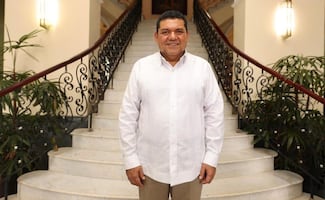Más Información

Detienen a presuntos implicados en caso de tiktoker "Nicholette" en Culiacán; Fiscalía de Sinaloa mantiene abiertas las investigaciones

Reportan hospitalización de Javier May Rodríguez por molestia abdominal; se encuentra estable y en recuperación

Sheinbaum señala “show” de Alessandra Rojo de la Vega tras agresiones en operativo de reordenamiento; “no quiero opinar de ella”, dice
He was a body builder and a security guard, a religious man who attended the local mosque and who at one point expressed interest in becoming a police officer, though he never pursued it.
Early Sunday, 29-year-old Omar Mateen gunned down 50 people at a gay nightclub in Orlando, police said.
Mateen was the son of an Afghan immigrant who had a talk show in the United States, the nature of which was not entirely clear: A former Afghan official said the program was pro-Taliban and a former colleague said it was enthusiastically pro-American.
Mateen attended evening prayer services at the city's Islamic Center three to four times a week, most recently with his young son, said Imam Syed Shafeeq Rahman. Although he was not very social, he also showed no signs of violence, Rahman said. He said he last saw Mateen on Friday.
"When he finished prayer he would just leave," Rahman told The Associated Press. "He would not socialize with anybody. He would be quiet. He would be very peaceful."
He was also bipolar, Mateen's ex-wife, Sitora Yusufiy, told reporters in Boulder, Colorado.
Although records show the couple didn't divorce for two years after the marriage, Yusiufiy said she was actually only with Mateen for four months because he was abusive. She said he would not let her speak to her family and that family members had to come and literally pull her out of his arms.
"My personal opinion is that this has nothing to do with ISIS," Rahman said.
Omar Mateen had no criminal record, but Yusufiy said he owned a pistol. She said he wanted to be a police officer and had applied to the police academy. Mateen was a security guard at the G4S company, which identifies itself on its website as "the leading global integrated security company."
Authorities immediately began investigating whether the assault was an act of terrorism. A law enforcement official said the gunman made a 911 call from the nightclub professing allegiance to the leader of the Islamic State, Abu Bakr al-Baghdadi. The law enforcement official is familiar with the investigation but was not authorized to discuss the matter publicly and spoke on condition of anonymity.
The shooter in 2013 made inflammatory comments to co-workers, and Mateen was interviewed twice, FBI agent Ronald Hopper said. He called those interviews inconclusive. In 2014, Hopper said, officials found that Mateen had ties to an American suicide bomber. He described the contact as minimal, saying it did not constitute a threat at the time.
Mateen purchased at least two firearms legally within the last week or so, according to Trevor Velinor of the Bureau of Alcohol, Tobacco and Firearms
Rahman said he knew Mateen and his family since the shooter was a young boy. Playful as a child, he became more serious as an adult, Rahman said. He spoke both English and Farsi, and at one point wanted to become a police officer but never pursued it, the imam said. He was also into body building. He was not, as far as the imam could see, someone who would ever commit such a gruesome act of mass violence.
The shooting "was totally unexpected," Rahman said.
Noticias según tus intereses
[Publicidad]
[Publicidad]











